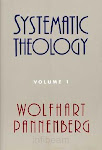This is an essay on the nature of doctrine. References are to Jaroslav Pelikan’s monographs on the development of Christian doctrine. Reference (3:241) would refer to volume 3, page 241.
1. Doctrine is “important”
2. Doctrine and mystery
3. The inadequacy of doctrine
4. The inevitability of doctrine
5. The scope of doctrine
6. “Hierarchies” of doctrine
7. The relation of words and reality
8. Liturgy as the fulfillment of doctrine
9. Love as the fulfillment of doctrine
-- -- --
The Relation of Words and Reality
So, there’s a difference between “real” assent and mere “notional” assent. There is also a difference between agreeing and disagreeing “really” or merely “verbally”.
Words seek to express in human language a reality that exists independent of them. Much of theological thinking – and dispute – requires as constant awareness of the relationship of words to reality. For, as history has repeatedly shown, oftentimes the thinking – or disputing – revolves around “mere words” without truly reaching the reality that is at stake.
We are told to avoid an “excessive preoccupation” with terminology (5:34), and to make sure our discussions and disputations are not “merely a dispute over words” (3:22). Anselm urged that we avoid “a quarrel about words” and stick to the substantive issues (3:230). Many stalwart theologians, such as Peter of Lombard and Duns Scotus, would consign much of theological dispute, even over the Filioque, to the category of “logomachy”, to mere dispute of words (5:34).
Everyone would agree that some differences did not pertain to dogma at all and that ways of speaking did not affect salvation. But some differences of Christology are “not merely of terminology but of doctrine” (2:57).
The controversy, for example, over whether original sin had become part of the “essence” of human nature is, most agree, “more than a quarrel over terminology” (5:35). Beyond some “methodological differences” in Trinitarian doctrine lay some “ultimate, metaphysical differences in the doctrine of God itself” (2:193). A fideist caution against logomachy can easily become an attack on doctrine itself, as in the case of Milton who questioned the entire Trinitarian orthodoxy (5:34-35).
Peter of Abelard said that although Mohammed “confesses that [Christ] is the messenger of God, the Word of God, and the Spirit of God, he does not understand or confess by the terms ‘messenger,’ ‘word,’ and ‘spirit’ what we do” (3:244).
Words are important for they point towards “something that seriously qualified” them (2:30), to the “fundamental content” of dogma (3:204).
I must, however, confess that I am lost in a hermeneutical mesh and swamped in a theological thicket.
For I cannot understand what, exactly, do we mean when we say that something is (or is not) of “fundamental content”, pertains to “the dogma itself”, conveys the “essence” of the thing, and so on.
All ways of explaining the difference between “real difference” and “difference in terms” seem to beg the question: What, precisely, constitutes this difference? How do words, even so-called “orthodox” ones, relate to the reality they seek to express (especially as this reality is, at times, nearly incomprehensible to begin with)?
Thus “clarifications” that appear (and portray) to be lucid and informative reveal, when considered more carefully, a fermenting series of serious problems of meaning and distinction. As in: “Theologians continued to recognize that the fundamental content of the dogma of transubstantiation was the doctrine of the real presence, rather than a particular philosophical definition of substance and accident” (3:204).
What an amalgam of ambiguities! What does “fundamental content” here mean? How is “real presence” less philosophical than a(nother) “philosophical definition” of the mystery?
It has sometimes been suggested that the difference between philosophical language and theological language is that theological language “contains the essence” of the reality it seeks to express. Unfortunately I have, to this day, no idea what this means.
1 month ago







1 comment:
yeah thanks for your comment. The thing is I need to find the peace and time to read your doctrine marathon. There is no way, I can even imagine to concentrate whilst JMan is running around. I am not "a woman" this talented way, can't divide my attention at all. suck at it.
Post a Comment